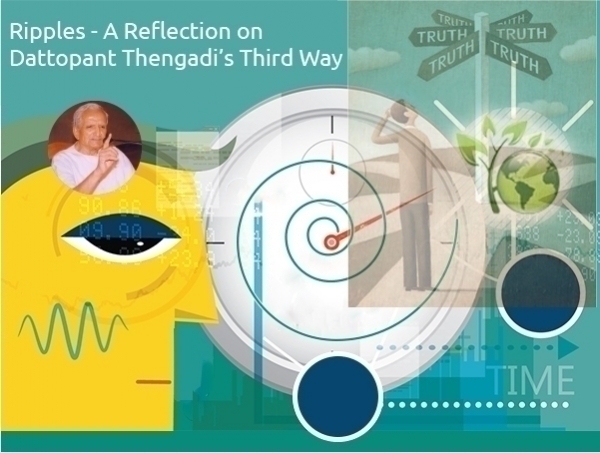Ripples A Reflection On Dattopant Thengadi's Third Way - Part 36
07 Jun 2022 10:44:33
I have been reflecting in my own way on Dattopant Thengadi Ji's Third Way. I present these small "ripples" that it has caused in my mind in a series. I am glad it has found its resonance in many thinking minds alike. I hope the readers have read the earlier article in the series before moving ahead.


Also Read: Ripples A Reflection On Dattopant Thengadi's Third Way - Part 35
Dattopant repeatedly stated that our society, its traditions, culture, and philosophical basis are different when compared with European or any other nation. A pluralistic society like our society requires a different institutional framework.
European nations have economic ideological parties. And the societies are not as pluralistic as our society. The major difference is in approach, in the economic area. Such parties may be described as left, right, or centrist.
Dattopant noted that the U.S.A too is a pluralistic society. So the parties are not economic ideological types. But it is not an ancient nation, the string of unity in diversity is not developed. The differences are resolved using institutional arrangements in the country.
In European countries, the differences are resolved outside the economic field. But the differences are sharp In our country. A small group with a small number of people may have a similar opinion on one issue but on some other point, they may not be on the same side. The grouping keeps changing. Ample examples can be cited if we closely view our social phenomena.
We need a framework different from the Westminster model fails to deal with the aspirations of people. Political parties alone cannot be expected to deal with the variety of issues in a pluralistic society like our society.
Dattopant repeatedly refers to the speeches by Shri Guruji delivered in Thane as the guiding light. (The major points are stated in one of the earlier write-ups.) He cites the example of the Yugoslavia experiment, though it failed, the value of experimenting cannot be neglected. The nation is disintegrated now. But analysis and study of such experiments, in a way, points out the fact that such systems and arrangements may be practicable.